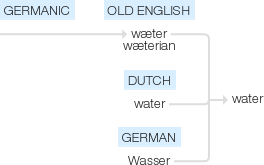Water
Old English wæter (noun), wæterian (verb), of Germanic origin; related to Dutch water, German Wasser, from an Indo-European root shared by Russian voda (compare with vodka), also by Latin unda ‘wave’ and Greek hudōr ‘water’.
wiktionary
From Middle English water, from Old English wæter(“water”), from Proto-West Germanic *watar, from Proto-Germanic *watōr(“water”), from Proto-Indo-European *wódr̥(“water”).
From Middle English wateren, from Old English wæterian, from Proto-Germanic *watrōną, *watrijaną, from Proto-Germanic *watōr(“water”), from Proto-Indo-European *wódr̥(“water”).
etymonline
water (n.1)
Old English wæter, from Proto-Germanic *watr- (source also of Old Saxon watar, Old Frisian wetir, Dutch water, Old High German wazzar, German Wasser, Old Norse vatn, Gothic wato "water"), from PIE *wod-or, suffixed form of root *wed- (1) "water; wet."
To keep (one's) head above water in the figurative sense is recorded from 1742. Water cooler is recorded from 1846; water polo from 1884; water torture from 1928. Linguists believe PIE had two root words for water: *ap- and *wed-. The first (preserved in Sanskrit apah as well as Punjab and julep) was "animate," referring to water as a living force; the latter referred to it as an inanimate substance. The same probably was true of fire (n.).
water (v.)
Old English wæterian "moisten, irrigate, supply water to; lead (cattle) to water;" from water (n.1). Meaning "to dilute" is attested from late 14c.; now usually as water down (1850). To make water "urinate" is recorded from early 15c. Related: Watered; watering.
water (n.2)
measure of quality of a diamond, c. 1600, from water (n.1), perhaps as a translation of Arabic ma' "water," which also is used in the sense "luster, splendor."
